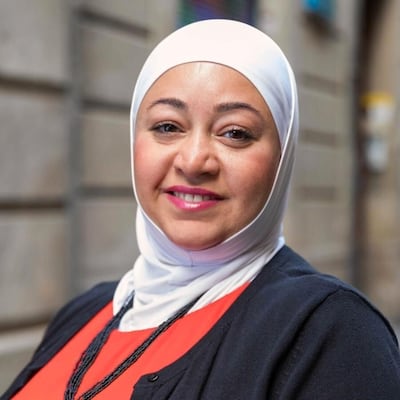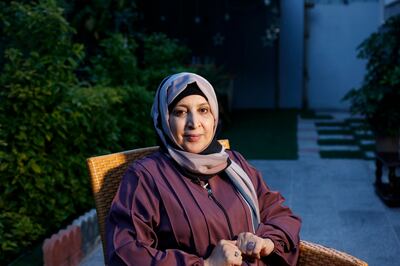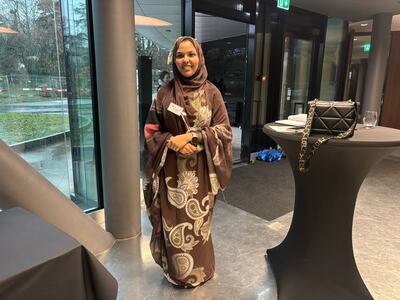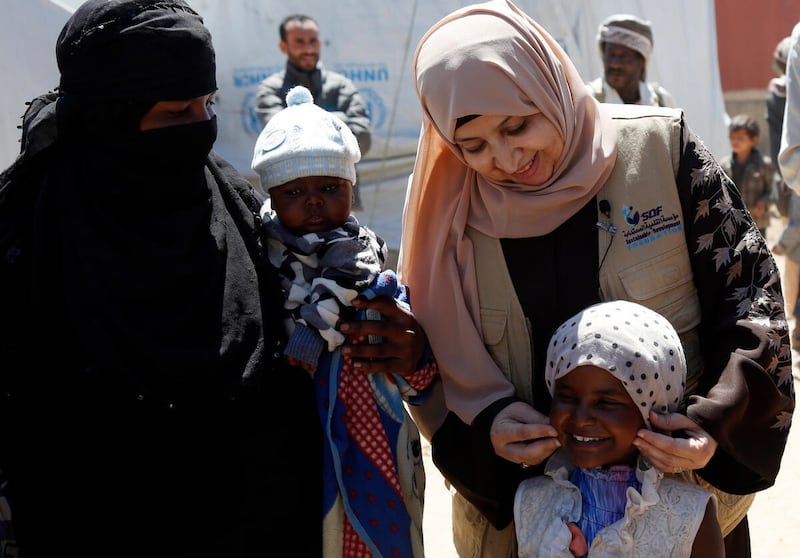Refugees and advocates are vying for their voices to be heard as legislators and donors set out their goals at the Global Refugee Forum.
Shaza Al Rihawi, a Syrian refugee living in Germany, was speaking about gender-based violence alongside the German and French foreign ministers on the forum’s opening day.
She has come a long way since she and other refugees were excluded from a consultation on refugees in Geneva six years ago. “We were not allowed to enter,” she said.
In response, she co-founded the Global Refugee-led Network, to create a “meaningful space” for displaced people to participate in key decision-making that affects them.
More than 300 refugees are among the 4,200 people attending at the forum this week, almost 10 per cent of the total. “Next time we would like to have 25 per cent,” Ms Al Rihawi said.
She hopes to see more support for host countries to provide education for refugees.
“It’s a way for communities to build their future,” she told The National. “We need to ensure that communities affected by displacement have the right to enter schools.”
This can also serve to “protect” children from illegal labour. “They might be in a poor situation, where they have to work and engage in the labour market to help their families,” she said.
In developed countries, including Germany, access to universities remains a challenge, owing to the cost of study and the paperwork involved. “In Europe sometimes its hard for people to engage in the universities,” she said.
“Either it's too expensive, or they need a lot of papers. If you’re fleeing your country, sometimes you cannot have all the documentation.”

Ms Al Rihawi recently returned from Cop28 in Dubai, where refugees were invited to speak about the impact of climate change on displaced people.
This year’s event had taken displaced people into “more consideration” than previous years, but more could done, she said.
“There is more consideration of the affected community,” she said. But “it was only for side events, not high-level ones”, she added.

Funding needed
Others have come to the Global Refugee Forum seeking funds for low to middle-income countries that are “bearing the brunt” of the global crisis.
Asia Al Mashreqi, co-founder of the Sustainable Development Foundation, supports refugees and internally displaced people in Yemen.
More than 95,000 asylum seekers from the Horn of Africa are living in Yemen, alongside millions of internally displaced people.
Yet in recent years, international humanitarian funding had been redirected to other crises, like the one stemming from the war in Ukraine.
“The humanitarian crisis in Yemen is a forgotten one, yet it is among the worst in the world,” Ms Al Mashreqi told The National.
The foundation supports the schooling and training of children and women from Yemen’s displaced communities.
Young people are taught a range of skills, such as fixing solar panels and computers, to digital marketing and entrepreneurship.
Educational programmes like this are essential, she said, to ensure the protection of Yemen's most vulnerable people. “It allows them to change their life for the better,” she said.
For her work, Ms Al Mashreqi was one of four regional recipients of the UNHCR Nansen Refugee Award, marked at the forum on Wednesday.
She called on the international community for more funding to support Yemen’s displaced, but asked for it to be accompanied by a long-term vision, rather than as an emergency response.
“It has to also be developmental, which will make it easier to find solutions for the future. We need a clear vision and strategy from the donors,” she said.

Chala Al Hussein, a Sahrawi refugee and architecture student, agreed on the need for better education.
Ms Al Hussein was born in a refugee camp at Tindouf, in southern Algeria, but today, she is a student at the University of Constantine in Algiers, owing to a scholarship. “I am 20 now, so I have been a refugee for 20 years,” she said.
“Of all the initiatives, education ones are the most important.
“We have teachers who are trained, but the opportunities are not there. We are still writing on chalk boards.”
Teaching English and French, languages not spoken in the camps, was also essential. She called on European countries to support language learning.
Ms Al Hussein was inspired to become an architect during a school visit to France and Spain, where she was overwhelmed by the densely built cities and remembers being particularly struck by Barcelona’s iconic modernist cathedral.
Today, she is looking for ways to improve the homes of people living in the camps where she grew up, which are subject to harsh weather and sandstorms.
Connectivity question
Others have called for more connectivity in refugee communities. Peter Batali, a South Sudanese refugee, runs an organisation that provides technology training in an isolated settlement in Uganda.
“After food, the next thing that refugees talk about is connectivity,” he told The National. “I'm here to amplify this voice.”
People travel long distances to get internet access for education, or to speak to loved ones living in different countries, he said. “When you go there you find that thousands of children and youth lack technology,” he added.
The Vodafone Foundation and Dubai Cares are part of a major pledge to develop connectivity in education for refugees, announced at the forum on Wednesday.
Mr Batali called on major telecoms and technology companies to support greater connectivity.
“We need all people that are players in technology, especially Vodafone, GSMA, Avanti and MasterCard. We need them to provide satellite communication and mobile network in the areas,” he said.







